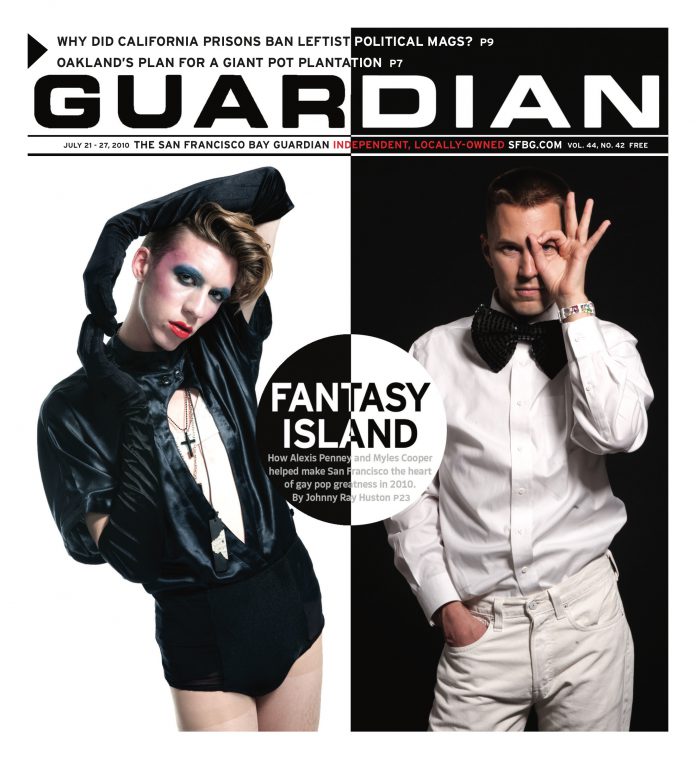arts@sfbg.com
SAN FRANCISCO JEWISH FILM FESTIVAL The question of how to represent the Holocaust is one that rightly haunts film history — rightly, because it was the Nazis themselves who most rigorously documented their destruction of Europe’s Jews, and thus it is to the Nazis that any filmmaker incorporating archival evidence owes a dubious debt. Certainly, documentary contemplations of the Holocaust have been instrumental not only to our philosophical understanding of the history, but also to the development of documentary form itself (I’m thinking of 1955’s Night and Fog, 1985’s Shoah, 1969’s The Sorrow and the Pity, and, less readily available, the works of Abraham Ravett and Péter Forgács). But given the relative invisibility of more recent genocides and the political inflection of what Norman Finkelstein uncharitably calls the "Holocaust Industry," it seems clear that a contemporary work needs a more dimensional rationale than "never forget."
The 30th San Francisco Jewish Film Festival includes several documentaries that at least peripherally touch on the Holocaust, but two are particularly ambitious: Einsatzgruppen: The Death Brigades and A Film Unfinished. The former is an exhaustive cataloging of the Nazi execution squads’ brutal charge to render the Eastern front: Judenfrei, incorporating textbook history, eyewitness accounts (adhering to Shoah‘s trifurcated structure of Jewish survivors, local collaborators and onlookers, and former Nazis on hidden camera), and an unrelenting case of archive fever. The same color footage of starving Jewish children we see in Einsatzgruppen washes up in Yael Hersonski’s A Film Unfinished, but here it’s the provenance of these images, filmed by Nazis in the Warsaw Ghetto, that’s being scrutinized.
Director Michael Prazan is primarily interested in how the Einsatzgruppen’s killing was done. This leaves plenty to sort out during the film’s three hours, especially given the still contentious issue of local collaboration — a Ukrainian woman he interviews movingly conveys the shattering realization that the murderers who spoke her language so well were indeed her people. But in Einsatzgruppen, eyewitness accounts like these are tangential to the grand historical perspective glued together by voice-over and traumatic archival images (Claude Lanzmann assiduously avoided both in Shoah). The voice-over speaks from nowhere, while the images of bloody pogroms and fresh corpses viewed from the vantage point of their killers are merely speechless.
Reappropriating Nazi propaganda is an old story — Frank Capra grabbed some of Triumph of the Will (1935) for Why We Fight (1943-1945), as does director John Keith Wasson at the beginning of his fine SFJFF film, Surviving Hitler: A Love Story. Contrary though the meanings may be, it’s difficult to sidestep the totalizing operation of propaganda. Keenly aware of this epistemological trouble, A Film Unfinished‘s Hersonski does everything she can to address Nazi footage in its specificity. Her coordination of primary documents is breathtaking, aligning the Nazi reels with the descriptive (and at times deconstructive) diaries of ghetto inhabitants and the court testimony of one of the cameramen. The invocatory effect acknowledges the gaps of the visible history as it articulates its layers. Hersonski is similarly clever in staging her interviews: she films survivors watching the reels in darkened theaters, alone, offering comments and startling yelps of recognition ("Oy, I knew that woman!")
Before a contemporary filmmaker leans on horrific archival images as self-evident documents, he or she really ought to see the clip in A Film Unfinished of Jewish prisoners being rounded up for a film shoot, terrified that they were being led to slaughter — which they were, of course. The filming was a rehearsal for the murders, and, as Einsatzgruppen shows us ad nauseam, the camera was occasionally present for the final moments as well. The death brigade’s supervisorial role in the Eastern European killings afforded them their "objective" camera positions — a fact that should give any well-meaning documentarian pause.
SAN FRANCISCO JEWISH FILM FESTIVAL
July 14–Aug. 9, most shows $11
Castro, 429 Castro, SF; Roda Theatre, 2025 Addison, Berk; CineArts@Palo Alto Square, 3000 El Camino Real Bldg Six, Palo Alto; Christopher B. Smith Rafael Film Center, 118 Fourth St., San Rafael
(415) 256-TIXX

